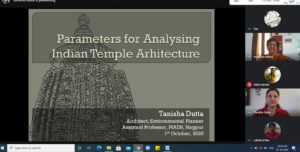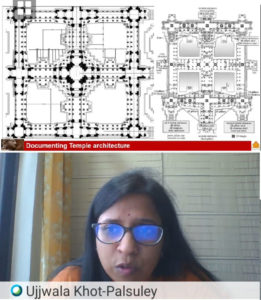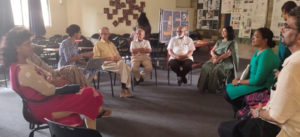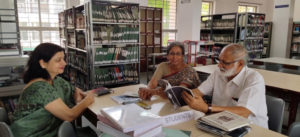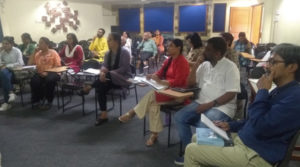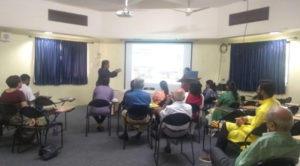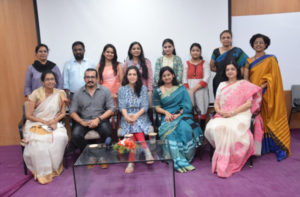DETAILS – GUEST LECTURE – 2020
– Guest Lecture by Ar. Tanisha Dutta on “Parameters for Analyzing Indian Temple Architecture”
PG department of Architecture Education hosted a Guest Lecture by Ar. Tanisha Dutta on Thursday, 1st October 2020 at 11:00 AM. The title of the lecture was “Parameters for Analyzing Indian Temple Architecture”and was linked to the ongoing studio of M.Arch (Arch Edu) III Semester.
Ar. Tanisha explained various key factors behind the concept of temples. She discussed the key differences between South Indian and North Indian types of temples. She discussed how temple is a representation of micro as well as macro systems of knowledge. Ar. Dutta elaborated on the various layers of temple logic.
Ar. Dutta discussed following Points :
- Concept behind the construction of temples
- Temple as a representation of macrosm and microsm
- Political influence and temples
- Mythology
- Residing Diety
- Vastu Purush Mandala
- Form of Shikhara
- Geometry of Ceilings
- Acoustics
- Ornamentation
She also discussed the key differences in North Indian and South Indian style of Temple architecture quoting examples of Sun Temple at Konark, Shore Temple, Lingaraj Temple etc.
The lecture was followed by interactive question and answer session. The guest lecture was attended by students, academicians and professionals. Around 45participants joined online for the guest lecture. The program was conducted by Dr. Madhura Rathod. Dr. Lakshmi Rao and Ar. Renuka Chutke Chakradeo were a part of support team to the guest lecture.
– Guest Lecture by Dr. Mainak Ghosh on “Role of Visual Perception in Design and Analysis of the Built Environment”
PG department of Architecture Education hosted a Guest Lecture by Dr. Mainak Ghosh on Thursday, 17th September 2020 at 11:00 AM. The title of the lecture was “Role of Visual Perception in Design and Analysis of the Built Environment”and was linked to the ongoing studio of M.Arch (Arch Edu) III Semester.
Dr. Ghosh introduced the 3 O’s of Visual Perception being Object, Observer, Others and interrelationship between those. He further explained what is psychological interaction and analytical factors for the same. The top down and bottoms up approach was also discussed.
He elaborated on the Environmental and socio-cultural aspects as significant factors which affect the perception.
Environment was discussed as synthetic and natural to focus on the understanding the pyramid of space, user and activity. User can be humans or animals. He explained that Environmental perception thus attributes the senses, mental processes which can be perceived in space and time through examples.
The socio-cultural aspects include material, method, modality, mythology which form the basis for analysis and design for cognitive judgements. The layers of analysis include physical attributes, visual attributes, impression, emotion and design.
He further explained Design and Creativity as processes. The taxonomy to create design was also discussed.
The lecture was followed by interactive question and answer session. The guest lecture was attended by students, academicians and professionals. Around 45participants joined online for the guest lecture. The program was conducted by Dr. Madhura Rathod. Dr. Lakshmi Rao and Ar. Renuka Chutke Chakradeo were a part of support team to the guest lecture.
– Guest Lecture by Ar. Ujjwala Khot Palsuley on “Analysing Temple Architecture – An Indian Viewpoint”
PG department of Architecture Education hosted a Guest Lecture by Ar. Ujjwala Khot Palsuley, on Tuesday, 8th September 2020. The title of the lecture was “Analysing Temple Architecture- An Indian Viewpoint”and was linked to the ongoing studio of M.Arch (Arch Edu) III Semester on “Geometry of Indian Architecture.”
Ar. Ujjwala discussed various stages of evolution of temple architecture. She discussed it through following examples:
- Dashavatra temple, Deogarh
- Gaudra Gudi Temple, Aihole
- Badami Cave Temple, Badami
- Durga Temple
- Kailasha Temple
- Mukteshwar Temple, Bhubhneshwar
- Brihadeshwara Temple Tanjavaur
- Kandaria Mahadev Temple
- Lingaraj Temple
- Rajarani Temple, Bhubneshwar
- Natraja Temple, Chidambara
- Sun Temple, Konark
Further, she discussed the Western approach in analyzing temples by quoting James Fergusson, .B. Havell, Percy Brown, Adam Hardy, Banister Fletcher, Christopher Tagdell. She also pointed out our dependency on these resources is because of inability to trace eastern literature and the invasions which lead to destruction of some of our resources.
Ar. Ujjwala referred to Kapila Vatsayan, Bettica Barmer, R. Nagaswamy’s writings as a reference for eastern literature. She explained the Eastern and Western viewpoint with the example of Brihadeshwara Temple.
She further concluded that it is important to understand the process and meanings of temples. Ar. Ujjwala stressed on linking different artforms, folkfare, stories as an integral part of studying temples. The oriental literature and practical application of the same becomes the base for research. The temples in Indian Context are “ Sarva Sarvatmakam” and should be looked through the same perspective only.
The lecture was followed by interactive question and answer session. The guest lecture was attended by students, academicians and professionals. Around 45participants joined online for the guest lecture. The program was conducted by Dr. Madhura Rathod. Dr. Lakshmi Rao and Ar. Renuka Chutke Chakradeo were a part of support team to the guest lecture.
– Guest Lecture by Ar. Ujjwala Khot Palsuley on “Documenting Temple Architecture”
PG department of Architecture Education hosted a Guest Lecture by Ar. Ujjwala Khot Palsuley, on Thursday, 3rd September 2020. The title of the lecture was “Documenting Temple Architecture” and was linked to the ongoing studio of M.Arch (Arch Edu) III Semester on “Geometry of Indian Architecture.”
Ar. Ujjwala addressed the audience about the need of architectural documentation. While elaborating on the need of documentation of built environment she discussed the practical, historical and aesthetic purposes of the same. Further, the techniques of documentation by hand and by digital mediums were also discussed. By quoting and explaining through the example of Angkor Wat temple at Cambodia, she narrated her own experience of documentation.
The lecture was followed by interactive question and answer session. The guest lecture was attended by students, academicians and professionals. Around 100 participants joined online for the guest lecture. The program was conducted by Dr. Madhura Rathod. Dr. Lakshmi Rao and Ar. Renuka Chutke Chakradeo were a part of support team to the guest lecture.


